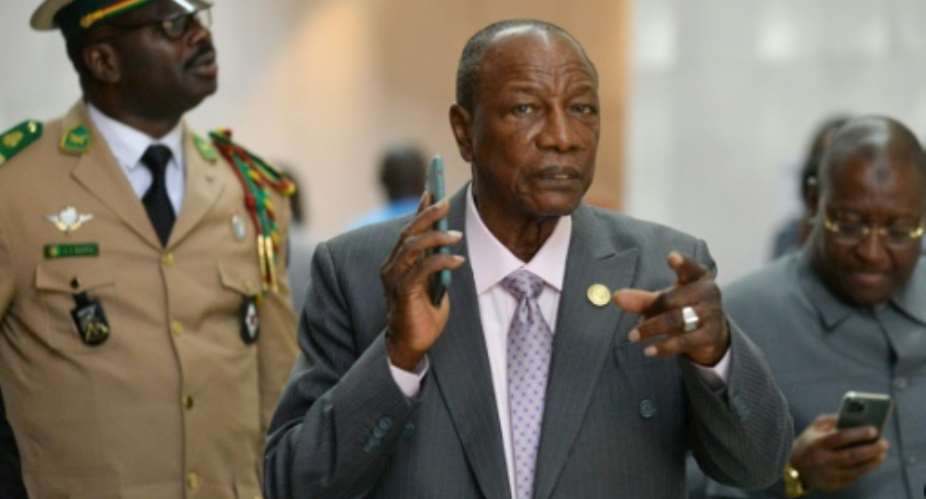To critics, he is an addition to Africa's long list of autocrats, but Guinea's 81-year-old president, Alpha Conde, says he is simply enacting his vision of hauling the country into the 21st century.
Conde's ambitions face a critical test on Sunday, when his impoverished state holds a referendum to modify the constitution.
Opponents see it as a plot to enable Conde, nearing the end of the two terms allotted under the present constitution, to restart the clock and stay in power for up to another decade.
Deadly protests since October have claimed at least 31 lives, including a gendarme.
For Conde, the changes will create a "modern constitution" -- and as to whether he intends to run again in presidential elections late this year "that's for the party to decide".
Conde's tactical skills were forged by years in exile or prison, followed by an almost miraculous rise to power.
The former opposition leader became Guinea's first democratically elected president in 2010 and was returned to office by voters in 2015.
But critics say he has become authoritarian, intolerant of dissent and increasingly tempted to wield the iron fist.
"If anyone comes to wreck the ballot boxes, hit them," Conde urged supporters ahead of Sunday's vote, which will also elect a new legislature.
Conde has been "so disappointing", said opposition leader Cellou Dalein Diallo, a former prime minister.
He has created "a banana republic -- a dictatorship in all but name", Diallo said.
An alliance of parties, unions and grassroots groups opposed to the referendum delivered a similarly brutal judgement.
"He took himself for Mandela but decided to become Bokassa," it said, referring to Jean-Bedel Bokassa, the former president of the Central African Republic who declared himself emperor.
French education
Conde was born in Boke, western Guinea, to a family in the Malinke ethnic group, the country's second largest.
Aged just 15, he headed to France, the colonial power at the time, where he gained diplomas in economy, law and sociology, and thereafter taught at the Sorbonne.
In the heady years after independence in 1958, Conde led a French federation of African students and spurred opposition to the dictatorship of Guinea's first post-colonial leader, Ahmed Sekou Toure.
Sekou Toure had Conde sentenced to death in absentia in 1970.
He returned to the country in 1991, seven years after Sekou Toure's death, and contested presidential elections in 1993 and 1998.
He gained 27 percent in the first and 18 percent in the second -- neither ballot was deemed internationally to be free and transparent.
His activism as founder of the Rally of the Guinean People (RPG) was deemed a threat by the then president, Lansana Conte, who had him arrested just after the 1998 elections.
In 2000, he was given a five-year jail term for "harming the authority of state and the integrity of national territory," but was pardoned the following year thanks to international pressure.
Conde stayed in the opposition after a military junta, led by Captain Moussa Dadis Camara, took power.
In 2010 came the annus mirabilis, when Conde, after defeat by Diallo in the first round, romped to victory in the runoff.
'Impulsive'
An elegant dresser who walks with a slight limp, Conde has been married three times and has one son.
He is a skillful speechmaker who can work a crowd.
When he turns to his record, he talks up the building of hydro-electric dams, rewriting mining contracts and tightening control over the army -- all this while the country was struggling with an Ebola epidemic that ran from late 2013 to 2016.
The centrepiece of his second term is to bring Guinea a constitution "which responds to the needs of the world today", to fight female genital mutilation and ensure fairer distribution of the country's mineral wealth.
His adversaries see him as a man in a hurry -- sharp-tongued, impulsive, authoritarian.
He once mocked students who demanded he provide the computer tablets he had promised during his election campaign.
"You're like baby goats -- 'tablets, tablets'," he said sarcastically, as he performed a little goat-like jump.
"Conde has definitely done some things important in moving Guinea forward," said Jim Wormington of Human Rights Watch (HRW), referring to local government and army reforms.
If the recent violence and push for the referendum could be factored out, "it would be possible to paint quite a positive picture" of Conde, he said. "That's what makes his position so sad."
siu-bm-eml-cv/lal/ri/jj





 We’ll no longer tolerate your empty, unwarranted attacks – TUC blasts Prof Adei
We’ll no longer tolerate your empty, unwarranted attacks – TUC blasts Prof Adei
 Bawumia donates GHc200,000 to support Madina fire victims
Bawumia donates GHc200,000 to support Madina fire victims
 IMF to disburse US$360million third tranche to Ghana without creditors MoU
IMF to disburse US$360million third tranche to Ghana without creditors MoU
 Truck owner share insights into train collision incident
Truck owner share insights into train collision incident
 Paramount chief of Bassare Traditional Area passes on
Paramount chief of Bassare Traditional Area passes on
 Two teachers in court over alleged illegal possession of BECE papers
Two teachers in court over alleged illegal possession of BECE papers
 Sunyani: Victim allegedly shot by traditional warriors appeals for justice
Sunyani: Victim allegedly shot by traditional warriors appeals for justice
 Mahama vows to scrap teacher licensure exams, review Free SHS policy
Mahama vows to scrap teacher licensure exams, review Free SHS policy
 Government will replace burnt Madina shops with a new three-story, 120-store fac...
Government will replace burnt Madina shops with a new three-story, 120-store fac...
